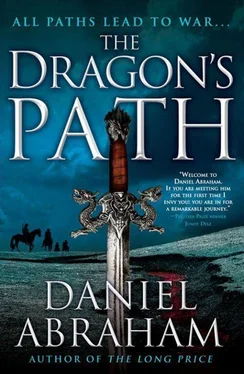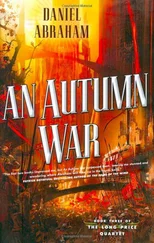Daniel Abraham - The Dragon's Path
Здесь есть возможность читать онлайн «Daniel Abraham - The Dragon's Path» весь текст электронной книги совершенно бесплатно (целиком полную версию без сокращений). В некоторых случаях можно слушать аудио, скачать через торрент в формате fb2 и присутствует краткое содержание. Жанр: Фэнтези, на английском языке. Описание произведения, (предисловие) а так же отзывы посетителей доступны на портале библиотеки ЛибКат.
- Название:The Dragon's Path
- Автор:
- Жанр:
- Год:неизвестен
- ISBN:нет данных
- Рейтинг книги:4 / 5. Голосов: 1
-
Избранное:Добавить в избранное
- Отзывы:
-
Ваша оценка:
- 80
- 1
- 2
- 3
- 4
- 5
The Dragon's Path: краткое содержание, описание и аннотация
Предлагаем к чтению аннотацию, описание, краткое содержание или предисловие (зависит от того, что написал сам автор книги «The Dragon's Path»). Если вы не нашли необходимую информацию о книге — напишите в комментариях, мы постараемся отыскать её.
The Dragon's Path — читать онлайн бесплатно полную книгу (весь текст) целиком
Ниже представлен текст книги, разбитый по страницам. Система сохранения места последней прочитанной страницы, позволяет с удобством читать онлайн бесплатно книгу «The Dragon's Path», без необходимости каждый раз заново искать на чём Вы остановились. Поставьте закладку, и сможете в любой момент перейти на страницу, на которой закончили чтение.
Интервал:
Закладка:
Instead, I think it is clear, the Drowned are the clearest example of humanity as artistic expression, and as such—
Or would aesthetic intention be more accurate than artistic expression? Geder rubbed his eyes. It was late. Too late. Tomorrow was another long ride to the south with another day of the same following it. If God was kind, they’d reach the border in a week, spend a day or at worst two choosing the field of battle, a day to crush the local forces, and he could be in a real bed, eating real food, and drinking wine that didn’t taste of the skin it had been carried in. If he could only make it that far.
Geder put the book aside. He combed his hair, pleased by the absence of lice. He washed his face and hands, then laced up his vest for the short trek to the latrines as a last stop before bed. Outside his tent, his squire—another gift from his father—slept curled in a ball after the Dartinae fashion, eyes glowing a dull red behind their lids. Beyond him, the army lay on the countryside like a moving city.
Cookfires dotted the nearby hills and filled the air with the smell of lentils. The carts were gathered in the center of the camp, and the mules, horses, and slaves were all in separate corrals beside them. A cold wind blew from the north. It was a good sign. No rain. The moon had crawled halfway up the sky, its crescent offering the idea of light more than actual illumination, so Geder made his way to the latrine carefully.
The essay kept turning itself in his mind. He wished there was someone on the march with whom he could discuss the matter, but speculative essay wasn’t considered a manly art. Poetry. Riding. Archery. Swordplay. Even history, if it was done with sufficiently apt turns of phrase. But speculative essay was a guilty pleasure, best hidden from his companions. They laughed at him enough for the size of his belly. No need to give them more stones for their slings. But if not aesthetic intention … was the Cinnae author really saying that the Drowned were only brought into existence because they made the shoreline pretty?
The latrine was empty, a small cloth tent with two rough planks spanning a pit. Geder took down his hose, his mind still turning on the fine points of the book. He noticed the sweet smell under the reek of shit, but didn’t put importance on it. He sat his bare ass on the planks, sighed, and wondered a moment too late why the latrine smelled of sawdust.
The planks gave way, and Geder shrieked as he tipped backwards and down into the foul-smelling swamp of turds and piss. One of the planks bounced against the side of the pit and gouged his arm. The force of his landing blew the breath out of him. He lay stunned in the stinking darkness, his jacket and hose soaking up the sewer wetness and the cold.
Laughter came from above him. And then light.
Four lanterns shed their hoods, glowing in the sky above him. The light hid the faces of the men who held them, but the voices were clear enough. His so-called friends and companions of the sword. Jorey Kalliam, son of the Baron of Osterling Fells. Sir Gospey Allintot. Sodai Carvenallin, secretary to the High Marshal. And, worst of all, Sir Alan Klin, captain of the company, Geder’s immediate superior, and the man to whom he would have reported the poor behavior of his fellows. Geder stood up, his head and shoulders peeking above the pit while the other men howled their mirth.
“Very funny,” Geder said, holding shit-stained hands up to them. “Now help me out of this.”
Jorey took him by the arm and hauled him up. He had to give the man some credit for not shying away from the mess they’d tipped him into. Geder’s hose hung at his knees, soaked and filthy. He stood in the lantern light considering whether to put them back on or go naked from the waist down. With a sigh, he pulled up the hose.
“You were our last hope,” Klin said, pounding Geder’s shoulder. There were tears of hilarity running down his cheeks. “Everyone else noticed something wrong. Well, except Sodai, but he was too skinny to break the boards.”
“Well, it was an excellent joke,” Geder said sourly. “Now I’m going to go find something clean to—”
“Ah, no,” Sodai said in his nasal, high-town accent. “Please, my friend. Don’t spoil the night. It was a jest! Take it as it was meant.”
“It’s truth,” Klin said, putting an arm around Geder’s shoulder. “You must let us apologize. Come, my friends! To the tents!”
The four men stumbled off through the darkness, hauling Geder along with them. Of the four, only Jorey seemed genuinely sympathetic, and then only in his silence.
All through his childhood, Geder had imagined what it would be to serve the king, to ride on campaign, to prove his cleverness and his strength in arms. He read stories of the great warriors of old, heard his father’s wine-soaked anecdotes about the friendship and camaraderie of the sword.
Reality disappointed.
The captain’s tent was heavy leather strung on iron frames. Inside, it was more luxurious than Geder’s home. Silk hung from the ceiling, and a great fire roared in the pit, smoke channeled up and out by a hanging chimney of finely wrought chain and blackened leather. The heat was like walking into the worst of summer, but at least there was a bath drawn, and Geder didn’t shiver as he pulled off his soiled clothes. The others shed the gloves and jackets that had been contaminated by touching Geder, and a Timzinae slave boy took it all away.
“We, my friends, are the pride and hope of Antea,” Klin said as he filled a deep flagon with wine.
“To King Simeon!” Gospey said.
Klin pressed the flagon into Geder’s hand and stood with the wineskin in his own.
“To Kingdom and Empire,” he said. “And confusion to the upstart in Vanai!”
The others rose. Geder stood in his bath, water running down him, because to stay seated would have been a petty treason. It was the first toast of many. Sir Alan Klin was many things, but stingy with his wine wasn’t one. And if Geder had the sense that his flagon was always a little more filled than the other men’s, it was surely only a sign of the captain’s contrition, an apology for the evening’s prank.
Sodai declaimed his latest sonnet, a bawdy tribute to one of the more popular road whores who followed the campaign. Klin topped the performance by extemporizing a speech on the manly virtues of strength at arms, cultured arts, and sexual prowess. Jorey and Gospey pounded out a merry song on drum and reed organ, their voices harmonizing beautifully. When the turn came to Geder, he rose from the tepid bath, recited an explicit rhyme, and did the little jig that went with it. It was something his father had taught him once when they were deep in their cups, and Geder had never shared it outside the family. It wasn’t until he finished, the other men helpless in their laughter, that it occurred to him how very drunk he must be to have repeated it here. He smiled to hide the sudden stab of anxiety. Had he just become complicit in his own humiliation? The smile goaded them on to new hilarity, until Klin, breathless, pounded the floor and gestured that Geder should sit.
There was cheese and sausage, more wine, flatbread and pickles, more wine. They talked about things that Geder could hardly follow at the time, much less recall later. At some point, he found himself going on with a drowsy gravity about the Drowned as artistic expression, or possibly aesthetic intention.
He woke in his own waxed-cloth tent, cold and aching and without memory of coming back to it. The thin, unkind light of the coming dawn pressed in through the cloth. A breeze whistled. Geder pulled his blanket up around his head like a fishwife’s kerchief and willed himself back to sleep for just a few minutes more. The lingering tendrils of dream teased his mind, but the blare of the assembly call ended all hope of rest. Geder struggled up, put on a fresh uniform, and pulled back his hair. His guts were in riot. His head was in a debate between pain and illness. If he vomited inside the tent, no one would see it, but his squire would have to clean it up before they struck down for the day’s ride. If he went outside, he’d almost certainly be seen. He wondered how much he’d drunk the night before. The second assembly call came. No time for it now. He gritted his teeth and set out once again for the captain’s tent.
Читать дальшеИнтервал:
Закладка:
Похожие книги на «The Dragon's Path»
Представляем Вашему вниманию похожие книги на «The Dragon's Path» списком для выбора. Мы отобрали схожую по названию и смыслу литературу в надежде предоставить читателям больше вариантов отыскать новые, интересные, ещё непрочитанные произведения.
Обсуждение, отзывы о книге «The Dragon's Path» и просто собственные мнения читателей. Оставьте ваши комментарии, напишите, что Вы думаете о произведении, его смысле или главных героях. Укажите что конкретно понравилось, а что нет, и почему Вы так считаете.










